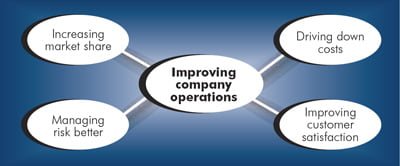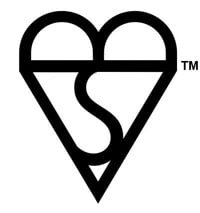Successful businesses meet customer requirements. Customers expect products and services to meet certain standards and a Standard is a document that gives guidance on achieving this. It acts as a set of rules or guidelines for everyone involved in producing goods, managing a process or delivering a service.
BSI was the pioneer in creating quality and safety standards. It is the UK’s National Standards Body and was the world’s first. BSI also plays a prominent role in the development of global standards. It:
- leads in the creation of standards
- tests and certifies products and services
- is one of the organisations that assesses Quality Management Systems (QMS).
Businesses gain an advantage over rivals by producing high quality goods and services that clearly meet standards. The standards are based on agreed best practice, for example, in handling environmental waste or meeting safety standards.
Businesses across the globe seek to meet international standards. For example, an engineering company in the Far East might use international standards for its components and finished items. These show the world that its products meet this international standard and that it is willing to take part in global manufacture and trade.
There are thousands of standards available for businesses to choose to use, depending on the type of sector the business is operating in. There are standards for education, transport, health, retailing and many more sectors.

Standards help organisations to achieve safe and quality products, and services to meet their needs and those of their customers. For example, in a nursery school, parents would want to know that equipment such as climbing frames and bouncy castles meet the required safety standards. Therefore, manufacturers of these products would want to follow the appropriate standards.

Two products may both be seen as quality products by their different users. For example, a village football team might be happy with a good football that they can kick around in a Sunday afternoon fixture. In contrast, the England football team would require a football that was up to international football (FIFA) standards. Quality can therefore be defined as being fit for the customer’s purpose.
The most successful organisations are those that give customers what they want. Satisfied customers are loyal to those companies they feel best to understand their requirements. As a result, they make repeat purchases and often recommend a business to their friends.
Organisations that meet standards in everything they do are most likely to give their customers the required quality. This is why a Quality Management System is so important. Quality Management is the process of managing quality at every stage within an organisation and commitment to it begins with the senior managers.

Best practice
BSI helps organisations to identify best practice in the manufacture of materials or products and translate this practice into standards. For example, standards for sports equipment, such as basketball goal posts, highlight the need to use the most suitable materials and fixtures in the equipment. BSI works with industry specialists to identify best practices.
Currently BSI publishes almost 20,000 standards and each year adds 2,000 new or revised standards to the list.
There are a number of levels of standards creation. The highest level International Standards is the most complex. It requires the widest level of agreement between those creating the standards.
These standards have to satisfy the needs of the different groups represented, such as industrial, trade and consumer groups of all of the countries involved.
- ISO is an international standard and applies in most countries. These international standards, which are identified by the letters ISO, are most widely recognised across the globe.
- EN is a European Standard and is used throughout the countries of the European Union.
- BS means the Standard is a British Standard.
A good example of an international standard relates to the format of credit cards. Standard number BS EN ISO 7810: 1996 defines their dimensions. Keeping to this Standard is important as it means that people can use the cards worldwide. A traveller without cash in another country can be confident they can get money using their own card.
As a customer, you will have a lot more confidence in products you know have been tested and meet British, European and International Standards. In the same way, your school will want to purchase gym and science lab equipment that meets the specifications of the safety standards.
Benefits of meeting standards
Businesses therefore benefit from working with BSI to meet standards, because:
- standards protect consumers’ fundamental right to safety, the right to be informed and the right to choose. These rights relate to products, services, processes and materials.
- standardisation promotes effective research and development, and makes products easier to use.
- standardisation relies on all sections of society being involved in standards. This provides an opportunity for everyone to share knowledge and make their voice heard.
Competitive advantage
A focus on quality also delivers a competitive advantage. Many businesses cannot compete by lowering prices because their market, for example, clothes or food, is very competitive. Therefore, they compete on quality.
This means they deliver quality products at the right time to fit their customers’ needs. Companies that focus on quality can compete against rivals who have lower cost bases.
A quality product is one that meets the requirements of its user. For example, a motorcyclist would want to purchase a helmet that had met tough road safety tests.
BSI is an independent, non-governmental organisation that offers product testing and certification services as part of its business. BSI works with many different types of organisations, including commercial and private companies, government bodies and trade associations. It helps these organisations produce safe and quality products that meet the safety and quality requirements of the countries in which they are to be sold.
Countries around the world have different requirements that products and services have to meet in order for them to be legally sold or delivered. This means that BSI offers access to these markets for their customers.
For example, in the motor vehicle industry, certificates are required by European bodies for a variety of components for new road vehicles. BSI helps UK motor manufacturers by testing and certifying that their products meet the required standards. Some of the products that BSI tests for the UK motor industry include vehicle lighting, vehicle glass, motorcycle helmets and electronic equipment.

The Kitemark® schemes are voluntary, so it is the manufacturer or service provider’s choice to go through the assessment process to gain the Kitemark®. This clearly demonstrates that the manufacturer or service provider is committed to delivering a safe and quality product that meets the standards set.
A Kitemark® means BSI has independently tested the product and that it conforms to or exceeds the criteria of the relevant British Standard. BSI issues a BSI Kitemark® license to the company to use the Kitemark®. The manufacturer pays for this service. This is only the start of the Kitemark® process. The product is tested and the manufacturing process is assessed at regular intervals following the issue of the license.
The Kitemark® is the symbol that gives consumers the assurance that the product conforms to the appropriate British, European or International Standard. It should therefore be safe and reliable. Manufacturers do not by law have to display a Kitemark® on their products, but many do because it encourages consumers to buy and demonstrates the company’s commitment to producing safe quality products.
CE marking
Many products, such as new toys, must meet legal requirements before they can be sold within the European Community. These must carry CE marking. CE marking on a product is a manufacturer’s claim that it meets all the requirements of the European legislation.
Some products carry both a Kitemark® and CE marking but the two symbols indicate different degrees of certification.
Businesses that work with international standards can create quality systems covering every aspect of their business. For example, a number of organisations work with BSI to create Quality Management Systems (QMS).
To achieve ISO 9001, organisations must meet eight quality management principles. These include:
- customer focus
- leadership commitment to quality by the leaders of the organisation
- involvement of people everyone in the organisation has a part to play
- making sure that those processes which create quality are identified
- continual improvement of the system.
When the organisation feels confident it is meeting the standard, it informs an assessor. The assessor will assess the effectiveness of the QMS. If it meets the standard a certificate will be awarded. This is subject to regular reviews.
As well as building internal systems (inside the organisation), external systems (such as suppliers) must also meet quality standards.
The supply chain
Today, many businesses have long supply chains. This means they may source materials, parts and finished goods from across the globe. For example, consider a modern plasma screen television. Some of the components may come from India, others from China or Eastern European countries.
These separate components are put together into a sub-assembly i.e. part of the finished television. Sub-assembly may take place in one country, with final assembly of the whole television taking place in another.
Unless all the businesses involved work to the same standard, the parts will not be able to be assembled properly. This working together is known as interdependence.
Standards in real life
To illustrate how important quality standards are, consider this case study on MC Fire Protection Ltd.
MC Fire Protection was established by Mike Chilman and is based in Bicester, Oxfordshire. It has been providing fire protection services for over 30 years. The company employs a team responsible for covering the supply, installation and maintenance of fire extinguishers and fire alarm systems. It also offers a consultancy service for all aspects of fire risk management. The company has earned an impressive reputation in the fire industry.
Changes in British and European legislation and demands from insurance companies are causing an increase in sales of fire systems. Businesses are legally required to take steps to protect themselves, staff and customers, from the danger of fire. Fire protection relies heavily on fire extinguishers and fire alarms. These have to comply with the fire safety standards. This means that users are confident the equipment will do its job.
Companies that provide fire risk assessments and consultancy services use these industry standards. By obtaining ISO 9001 registration, the company can show that the whole service is professional and quality assured.
The Managing Director of MC Fire Protection, Mike Chilman, explains why ISO registration is so important.
‘In 2004 our competitors were starting to publicise the fact that they complied with ISO 9001. Many businesses prefer to trade with companies that comply with recognised standards rather than with those that do not. On a practical level, ISO 9001 had made positive changes with improvements to our workshop, supply chain and record-keeping.
‘All the standards we apply have brought us extra reassurance. They help to show we are more professional, while our customers are confident that the services we provide are high quality. I would recommend standards to other businesses in the fire protection industry in fact, it’s becoming more and more of a necessity.’
